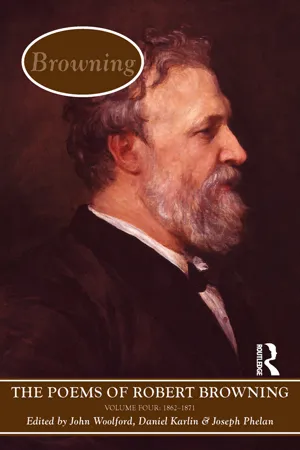
The Poems of Browning: Volume Four
1862 - 1871
- 608 pages
- English
- ePUB (mobile friendly)
- Available on iOS & Android
The Poems of Browning: Volume Four
1862 - 1871
About This Book
The Poems of Robert Browning is a multi-volume edition of the poetry of Robert Browning (1812 -1889) resulting from a completely fresh appraisal of the canon, text and context of his work. The poems are presented in the order of their composition and in the text in which they were first published, giving a unique insight into the origins and development of Browning's art. Annotations and headnotes, in keeping with the traditions of Longman Annotated English Poets, are full and informative and provide details of composition, publication, sources and contemporary reception.
Volumes one (1826-1840) and two (1841-1846) presented the poems from his Browning's early years, while volume three (1847-61) covered the period of his marriage to Elizabeth Barrett and residence in Italy. Volume four (1862-71) deals with the decade following Elizabeth's death and Browning's return to England. These years saw the appearance of some of his most significant work, and a steady rise in his critical reputation. In Dramatis Personae (1864), Browning uses his characteristic "dramatic" mode to expose predicaments of thought and feeling, in characters ranging from Shakespeare's Caliban to the cheating medium, "Mr Sludge"; other poems dramatize Browning's complicated feelings about the deceptions and self-deceptions of romantic love. Balaustion's Adventure (1871) is an engaging reworking of Euripides' Alcestis, whose theme, the resurrection of a beloved lost wife, has poignant personal resonance for Browning;while Prince Hohenstiel-Schwangau, published in the same year, offers a thinly-veiled account of the life and actions of Napoleon III, the recently deposed Emperor of France, over whom Browning and Elizabeth had quarrelled. In these two long poems, Browning can be seen engaged in the dialogue with Elizabeth that was to shape much of his work during the remainder of his writing life.
Frequently asked questions
Information
151 Prince Hohenstiel-Schwangau, Saviour of Society

Text and publication
The manuscript
Table of contents
- Cover
- Title Page
- Copyright Page
- Table of Contents
- Note by the General Editors
- Editorial Note to Volume IV
- Acknowledgements
- Chronology 1862–1871
- List of Illustrations
- Abbreviations
- 123 Deaf and Dumb
- 124 Caliban Upon Setebos
- 125 Too Late
- 126 Confessions
- 127 A Likeness
- 128 Rabbi Ben Ezra
- 129 James Lee [James Lee’s Wife]
- 130 Gold Hair
- 131 Dîs Aliter Visum
- 132 Youth and Art
- 133 The Worst of It
- 134 Apparent Failure
- 135 A Death in the Desert
- 136 Abt Vogler
- 137 Prospice
- 138 Mr. Sludge, “the Medium”
- 139 Epilogue [to Dramatis Personae]
- 140 Very Original Poem, written with even a greater endeavour than ordinary after intelligibility, and hitherto only published on the first leaf of the Author’s Son’s Account-book
- 141 Lines for a picture by Leighton [Eurydice to Orpheus]
- 142 Impromptu on Edward Burne-Jones
- 143 Hervé Riel
- 144 Epigram on Swinburne
- 145 Burlesque on the Pronunciation of ‘Metamorphosis’
- 146 A Round Robin
- 147 Helen’s Tower
- 148 The Dogma Triumphant
- 149 Mettle and Metal
- 150 Balaustion’s Adventure Including a Transcript from Euripides
- 151 Prince Hohenstiel-Schwangau, Saviour of Society
- 152 Epigram on Dickens
- Appendix A. Fragment of Beatrice Signorini
- Appendix B. Note on Dramatis Personae
- Index of Titles and First Lines